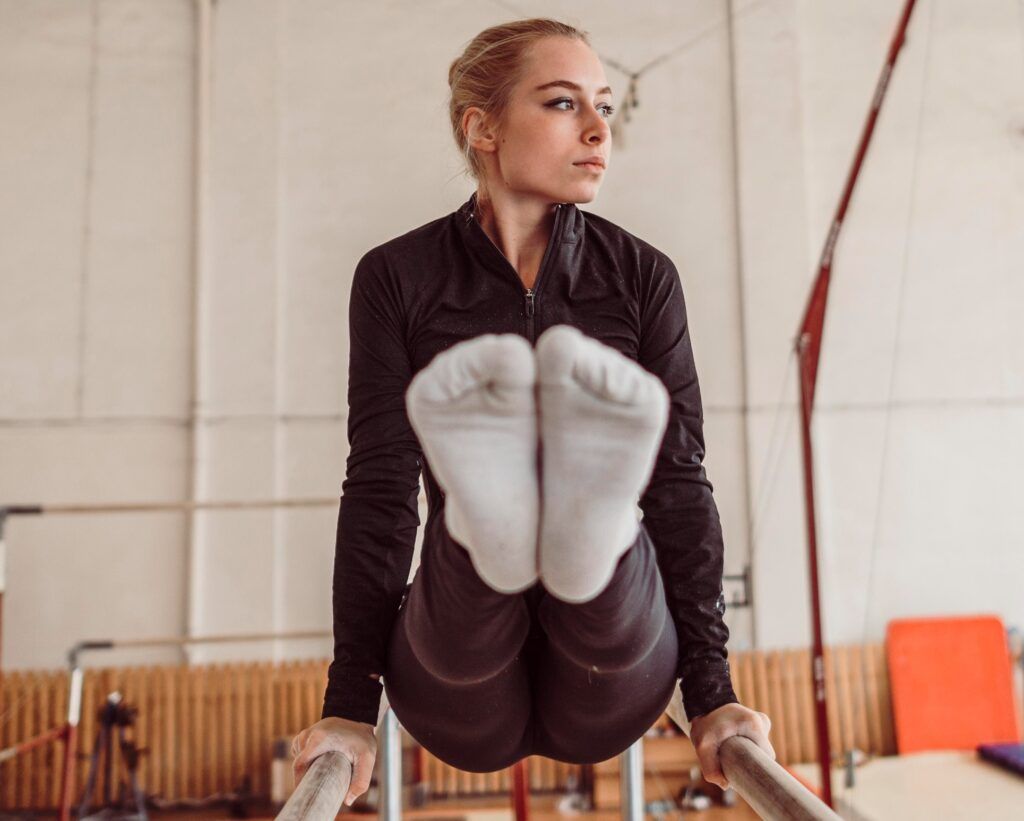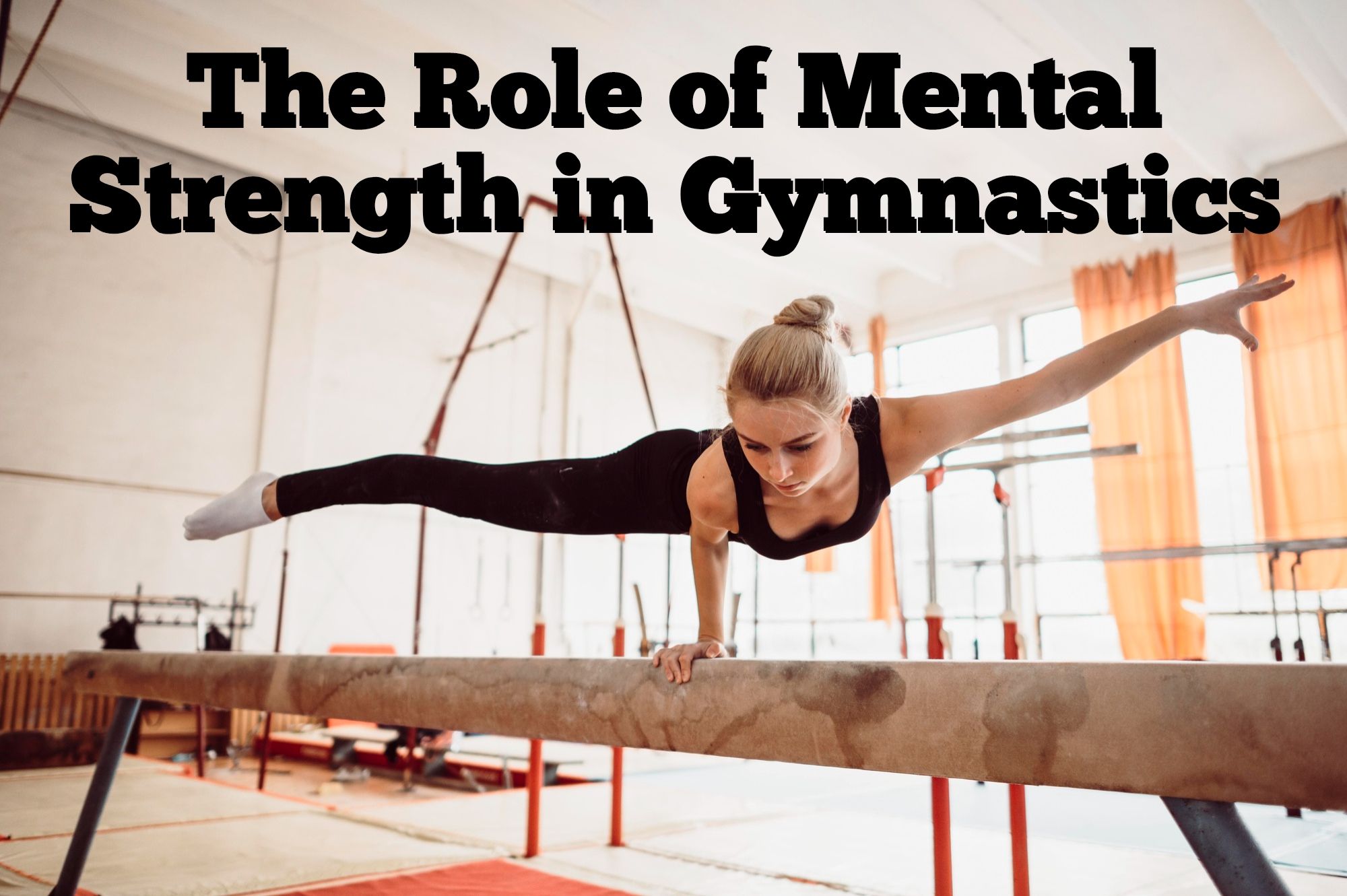Today, let’s chat about something super important in gymnastics – the mental game.
Personally, I think challenges are a big part of gymnastics.
Instead of dreading them, we should flip our perspective.
Imagine seeing each challenge as a chance to grow.
Every tough routine or tricky move is an opportunity to become better.
After all, setbacks happen to everyone.
Missed a landing?
Fell off the beam?
It’s okay.
These moments are stepping stones.
They’re not failures, but lessons.
Enjoy the process.
Visualization is a powerful tool.
Picture yourself nailing that routine.
Close your eyes and see every move, every detail.
Visualization trains your mind and body to execute with confidence.
The more vividly you can see it, the more likely you’ll achieve it.
To me, mindfulness is all about being present.
Focus on the here and now.
When practicing or competing, keep your mind on what you’re doing at that exact moment.
It helps in reducing stress and improving concentration.
Just breathe, focus, and perform.
The ability to stay strong and focused, no matter what happens, is crucial.
Practice staying calm under pressure.
Develop routines that keep you grounded.
Surround yourself with positive influences and keep pushing forward.
The mental aspect of gymnastics is just as crucial as the physical.
Gymnastics Mental Training: An Overview
|
The Psychology of a Gymnast: Exploring Mental Challenges

Inside the mind of a gymnast, a complex tapestry of thoughts, emotions, and expectations is constantly at play, influencing every leap, twist, and landing.
Understanding this mental landscape is crucial in comprehending the challenges gymnasts face and the resilience they must build to excel in their sport.
One of the most pervasive mental challenges for gymnasts is performance anxiety.
We’re talking about sweaty palms, a racing heart, and even shaky hands.
In a sport where precision is everything, this pressure can feel overwhelming.
Gymnasts face high expectations from coaches, judges, audiences, and themselves.
It’s a lot to handle.
Gymnastics routines demand intense focus.
One moment of distraction can lead to mistakes, and in this sport, mistakes can be dangerous.
Keeping that level of concentration is mentally draining but absolutely necessary.
In addition to these challenges, gymnasts often deal with the mental strain of rigorous training schedules and the demand for continuous improvement.
The mental fortitude required to handle these aspects of the sport is immense, making psychological training an indispensable part of a gymnast’s regimen.
Strategies for Improved Concentration
As someone fascinated by the world of gymnastics, I’ve come to appreciate how mental strength is just as important as physical skill.
Gymnasts have some impressive techniques to sharpen their focus, whether they’re training or competing.
Here are a few methods they use:
Mindfulness Practices:
This is all about staying present.
Gymnasts use mindfulness to calm their nerves and reduce stress.
Simple practices, like focusing on their breath or doing body scans before a routine, help them stay centered and clear-headed.
Visualization Exercises:
Ever heard of mental imagery?
Gymnasts create detailed mental pictures of their performances.
By visualizing each movement, they can improve muscle memory and build confidence.
It’s like a mental dress rehearsal that preps them for the real thing.
Goal Setting and Mental Rehearsal:
Setting clear, achievable goals keeps gymnasts on track.
They also mentally rehearse their routines, picturing each skill and how it feels.
This combo keeps them focused and boosts the quality of their performance.
Breathing Techniques:
Controlled breathing is a game-changer.
Deep diaphragmatic breathing helps reduce anxiety and regulate heart rate.
It’s a simple yet powerful way to stay calm and focused, especially when the pressure is on.
Cue Words and Mantras:
Short, powerful phrases can snap a gymnast’s focus back into place.
Words like “Stay calm” or “Strong and steady” act as mental anchors, reinforcing confidence and concentration.
Routine and Rituals:
Pre-performance routines or rituals are key.
Whether it’s a series of stretches, a specific warm-up, or repeating a mantra, these rituals help gymnasts get into the right mental state for peak performance.
Building Resilience in Gymnasts
Gymnastics is a discipline that is undoubtedly based on resilience, or the ability to recover from difficult situations.
Here’s my take on how gymnasts develop this key trait:
Adopting a Growth Mindset:
Gymnasts thrive when they believe they can improve with effort.
They see every challenge as a chance to get better, not a dead end.
Shifting focus from just winning to valuing effort and progress helps cultivate this mindset.
Building Inner Strength:
Mental toughness is as critical as physical ability in gymnastics.
Beyond just deep breathing, gymnasts use relaxation techniques like guided meditations and gentle exercises to recover after intense workouts.
This helps them manage both physical and mental stress.
Turning Setbacks into Learning Moments: In gymnastics, setbacks happen.
The key is how gymnasts deal with them. Great coaches create an environment where mistakes are viewed as learning opportunities.
By figuring out what went wrong and how to fix it, gymnasts turn setbacks into valuable lessons.
Creating a Strong Support Network:
Having a solid support system is essential.
Gymnasts rely on their coaches, teammates, family, and friends for emotional support.
This network boosts their confidence and helps them recover from setbacks faster.
Maintaining Physical Conditioning and Recovery:
Physical fitness supports mental resilience.
A strong, well-conditioned body handles the demands of gymnastics better and recovers faster.
Rest and recovery are just as important, as being tired can weaken even the toughest athletes.
Practicing Self-Reflection:
Regular self-reflection helps gymnasts understand their reactions to different situations.
By looking back on their experiences, they can identify their strengths and areas where they need to improve, building greater mental toughness.
Fostering a Positive Training Environment:
The training environment greatly affects resilience.
A supportive, positive atmosphere where effort is appreciated, and mistakes are seen as part of the learning process, can significantly enhance an athlete’s mental strength.
Historic Champions: Profiles of the Best Gymnasts Ever
Simone Biles (American, b. 1997): Watching Simone Biles perform is a marvel.
Her strength and agility are unmatched, and her ability to stay focused under immense pressure is awe-inspiring.
Nadia Comaneci (Romanian, b. 1961): Nadia Comaneci’s achievement of scoring the first perfect 10 in gymnastics is legendary.
It’s not just her technical prowess that captivates but also her calm demeanor and precise execution that made history.
Kōhei Uchimura (Japanese, b. 1989): Kōhei Uchimura excels in all-around events, showcasing remarkable consistency.
Known as “King Kohei,” he has dominated the sport for over a decade, winning numerous Olympic and World Championship titles.
Aly Raisman (American, b. 1994): Aly Raisman’s routines are always inspiring, reflecting her grace and determination.
Celebrated for her powerful floor exercises and impressive presence, Raisman has consistently captivated audiences with her blend of elegance and athleticism.
Max Whitlock (British, b. 1993): Max Whitlock’s skill on the pommel horse is a joy to watch.
His routines are a blend of elegance and precision, showcasing his extraordinary balance and control.
Whitlock’s mastery of complex moves and transitions sets him apart from his peers.
Conclusion
Anyone who observes a professional gymnast can see that their technique is not the result of chance.
Mental training makes the difference between good and great, between faltering and thriving.
Mental resilience and focus are just as important as physical skill.
Embracing mental conditioning builds a strong foundation for success.
It’s key to performing better, overcoming obstacles, and continuous growth.


